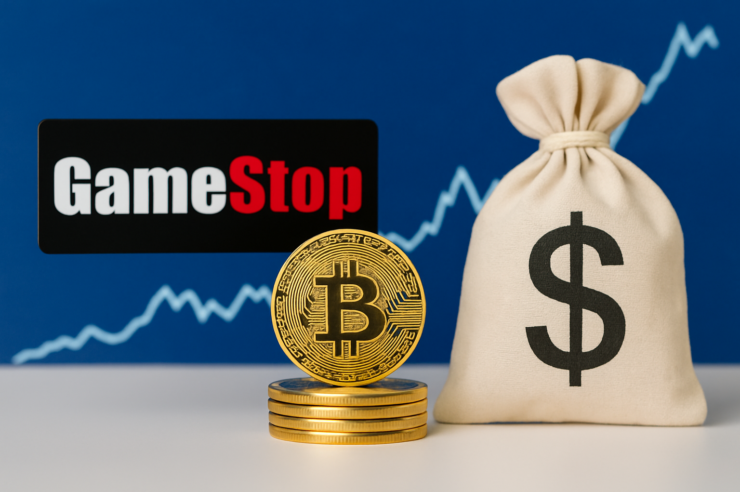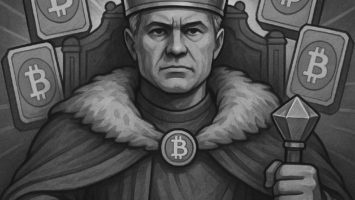Introduction
On May 28, 2025, GameStop shocked financial markets and its loyal investor base by announcing a massive $500 million investment into Bitcoin. The move marked a significant strategic shift for the company, which has long struggled to evolve in a rapidly changing retail and gaming landscape. While the stock dropped nearly 11% immediately following the announcement, market analysts and crypto enthusiasts alike have been debating the long-term implications of such a high-stakes bet on the world’s most dominant cryptocurrency.
This article explores the full context, motivations, risks, and implications of GameStop’s investment in Bitcoin. It delves into the evolving digital finance landscape, reviews the company’s financial and strategic posture, and evaluates how this pivot could reshape GameStop’s identity in the coming years.
A Strategic Pivot: From Video Game Retailer To Digital Asset Player
A History of Reinvention
GameStop has long been one of the most iconic names in gaming retail. Founded in 1984, it became a cultural staple for gamers during the 1990s and 2000s. However, as digital downloads and e-commerce disrupted brick-and-mortar retail models, GameStop faced mounting pressure to adapt.
The company saw brief resurgence during the “meme stock” era of early 2021, when retail investors organized on Reddit drove its stock price to astronomical highs. But this speculative wave did not change the fundamentals. Since then, GameStop has been searching for a new identity—one that can ensure long-term profitability in a digital-first world.
Enter Bitcoin
The $500 million Bitcoin purchase is more than just a financial investment—it’s a statement of intent. By moving aggressively into the crypto space, GameStop is signaling its belief that digital assets are not only viable investment vehicles but essential elements of future commerce, technology, and consumer interaction.
According to the company’s press release, the investment was made using existing cash reserves, and there are no immediate plans to sell any of the Bitcoin holdings. “This is a long-term strategic play,” said GameStop CEO Ryan Cohen. “We believe Bitcoin is more than just an asset—it’s a cornerstone of the future financial ecosystem.”
Market Reaction: A Mixed Bag
Stock Drop Reflects Uncertainty
Despite the boldness of the move, Wall Street’s initial reaction was negative. GameStop shares fell nearly 11% following the announcement. Investors seemed to interpret the decision as a high-risk gamble, especially given the company’s limited exposure to the crypto sector until now.
“This is a surprising turn of events,” said Morgan Stanley analyst Jennifer Lee. “It’s unclear how a large crypto holding will improve GameStop’s core business model. There’s potential here, but the risk is enormous.”
Crypto Enthusiasts Applaud the Move
On the other side of the spectrum, Bitcoin advocates celebrated the news. Social media platforms lit up with praise for GameStop’s boldness. Many believe the move adds a layer of legitimacy to Bitcoin as a corporate treasury asset.
“GameStop is doing what MicroStrategy did years ago—only with more mainstream cultural capital,” tweeted crypto investor Anthony Pompliano. “This is bullish for both Bitcoin and GameStop’s reinvention.”
Understanding The Rationale: Why Bitcoin?
Hedge Against Inflation and Fiat Risk
One of the main arguments in favor of Bitcoin investments is the asset’s role as a hedge against inflation and the devaluation of fiat currency. With ongoing global economic uncertainty, central bank policy volatility, and rising inflation rates, many companies are exploring alternative stores of value.
GameStop likely views Bitcoin as a strategic hedge—a way to preserve purchasing power and diversify its balance sheet beyond traditional cash and short-term securities. “Bitcoin is not correlated with traditional markets,” said CFO Diana Jaramillo. “That makes it an ideal component of a modern corporate treasury.”
Building Crypto Infrastructure
Sources close to the company also reveal that GameStop may be looking to develop or integrate cryptocurrency infrastructure into its existing retail and gaming services. With plans to enable Bitcoin payments, launch NFT marketplaces, and integrate digital wallets into its ecosystem, the investment may serve as a foundational move toward a broader crypto strategy.
If GameStop does pursue deeper crypto integration, it could unlock new revenue streams, attract a tech-savvy consumer base, and position the company as a pioneer in blockchain-based commerce.
Comparison With Other Corporate Bitcoin Investments
MicroStrategy and Tesla: A Precedent
GameStop is not the first major corporation to add Bitcoin to its balance sheet. MicroStrategy made headlines in 2020 and 2021 by investing billions of dollars into Bitcoin under the leadership of CEO Michael Saylor. Similarly, Tesla announced a $1.5 billion Bitcoin purchase in early 2021 and began accepting Bitcoin for vehicle sales (briefly).
However, what sets GameStop apart is the scale of the investment relative to its total cash reserves. While MicroStrategy and Tesla were already tech-centric companies with digital infrastructure, GameStop’s pivot from retail into cryptocurrency is more abrupt and arguably riskier.
“This is a transformative move,” noted investment strategist Carl Rudd. “If it works, it could redefine how legacy companies leverage crypto. If it fails, it could be catastrophic.”
Risks And Regulatory Concerns
Market Volatility
Bitcoin is notoriously volatile. Its price can swing by 5% to 10% in a single day. Such instability could pose financial and reputational risks for GameStop, especially if the company needs to tap into its reserves during market downturns.
Investors are also concerned about whether this decision aligns with GameStop’s core competencies. “They’re a gaming retailer—not a hedge fund or crypto exchange,” said financial analyst Renee Zhang. “They need to show how this fits into their long-term growth strategy.”
Regulatory Headwinds
The move also comes amid increasing scrutiny of the crypto industry from global regulators. The U.S. Securities and Exchange Commission (SEC) has been cracking down on unregistered offerings and questionable crypto practices. There’s a risk that future regulation could affect Bitcoin’s price or impose additional compliance burdens on corporate holders.
“We’re aware of the evolving regulatory landscape,” said GameStop’s legal team in a public statement. “We are taking all necessary steps to ensure compliance with current and anticipated regulations.”
Potential Benefits And Long-Term Vision
Attracting a New Customer Base
One possible benefit of the Bitcoin investment is the potential to attract younger, more digitally native consumers. This demographic is already well-acquainted with cryptocurrencies and may be more inclined to engage with a company that aligns itself with digital asset innovation.
By positioning itself as a forward-thinking brand, GameStop could reinvigorate its reputation and appeal to the same crowd that once drove its stock to all-time highs during the meme stock phenomenon.
Unlocking Digital Revenue Streams
If GameStop leverages its Bitcoin holdings to build new crypto-based products or services—such as gaming NFTs, decentralized marketplaces, or metaverse integrations—it could create entirely new revenue channels.
These digital extensions could serve as a buffer against declining retail performance and help future-proof the business model. “It’s about more than holding Bitcoin,” said blockchain consultant Dr. Esha Rao. “It’s about using that asset to create an ecosystem.”
Broader Implications For The Industry
Corporate Adoption of Crypto
GameStop’s move may encourage other mid-cap companies to explore Bitcoin investments. While tech giants like Apple and Amazon have yet to enter the crypto space meaningfully, a surge of smaller companies dipping their toes in could accelerate mainstream adoption.
“This is a tipping point,” said crypto strategist Diego Martinez. “When legacy firms like GameStop get involved, it legitimizes the asset class in the eyes of institutional investors and corporate treasurers.”
A Shift in Capital Allocation Strategy
Historically, corporate cash has been parked in low-risk, low-yield instruments like treasury bonds or money markets. GameStop’s decision challenges that norm, suggesting a broader shift in how companies think about capital preservation and growth.
If successful, this model could change how balance sheets are managed across industries, sparking a reallocation of corporate capital toward alternative assets.
Final Thoughts
GameStop’s $500 million investment in Bitcoin is one of the boldest financial moves made by a legacy retailer in recent history. It’s a high-risk, high-reward bet that could either transform the company into a digital finance leader or backfire spectacularly. Critics argue that the move distracts from core operations and adds unnecessary risk to an already vulnerable company. Supporters believe it marks the beginning of a new era—one where traditional firms embrace the decentralization and disruption that Bitcoin represents.
The months ahead will reveal whether this strategic pivot proves to be visionary or misguided. For now, GameStop is once again at the center of financial conversation—not because of a meme, but because of a massive commitment to the future of money itself.



